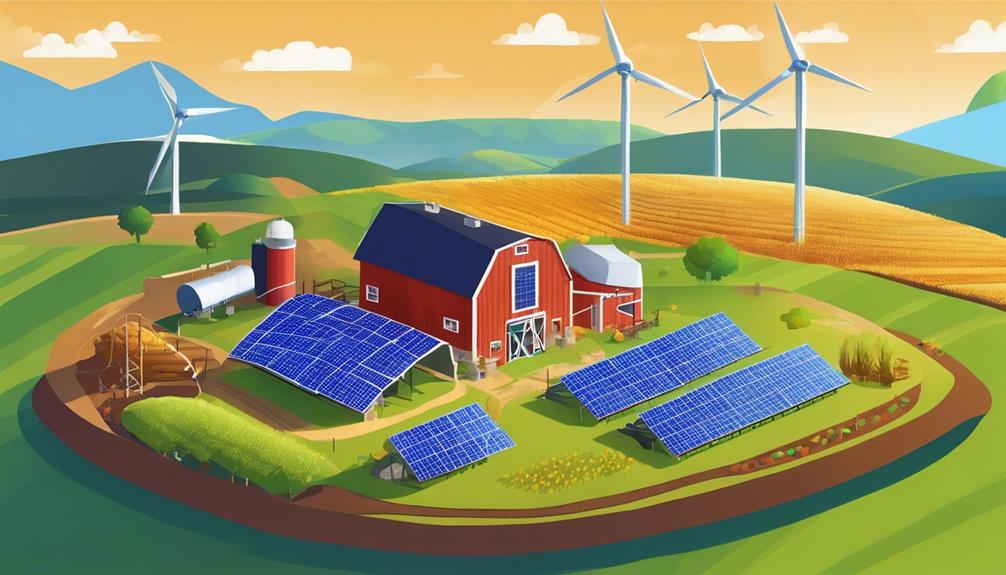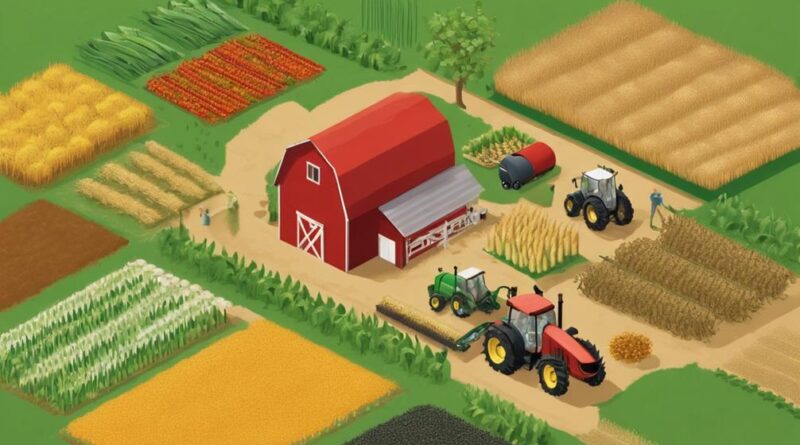What Is the Environmental Footprint of Different Farming Practices?
Ever wondered how farming practices impact the environment?
Organic farming, hailed as the golden child of sustainability, promises a multitude of benefits to the planet. But does it truly live up to the hype?
From carbon footprints to pesticide reduction, and energy efficiency to soil health, the environmental footprint of different farming practices is a complex web waiting to be unraveled.
So, are organic methods truly the green solution we've been searching for, or is there more to the story than meets the eye?
Impact of Organic Farming Practices
Organic farming practices significantly reduce the use of synthetic pesticides and fertilizers, leading to a more sustainable and environmentally friendly approach to agriculture. By focusing on natural methods to control pests and weeds, organic farming helps maintain soil fertility and promotes climate resilience.
One key benefit of organic farming is its positive impact on soil fertility. Instead of relying on synthetic chemicals that can degrade soil quality over time, organic farmers use techniques such as crop rotation, composting, and cover cropping to enhance soil health. These practices encourage beneficial soil organisms, improve soil structure, and increase nutrient availability, ultimately leading to higher yields and long-term sustainability.
In addition to promoting soil fertility, organic farming also plays a crucial role in enhancing climate resilience. Organic practices help sequester carbon in the soil, reducing greenhouse gas emissions and mitigating climate change. Furthermore, by avoiding the use of synthetic fertilizers that contribute to nitrogen pollution and greenhouse gas emissions, organic farming helps protect the environment and build resilience against extreme weather events.
Carbon Footprint of Organic Farming
With a focus on sustainability and environmental impact, exploring the carbon footprint of farming practices provides valuable insights into the overall ecological footprint of agricultural operations. When it comes to organic farming, the carbon footprint is significantly influenced by practices such as nutrient cycling and greenhouse gas emissions.
Organic farming relies on nutrient cycling to maintain soil fertility and productivity. By using organic matter like compost and manure, organic farmers enhance soil health and structure while reducing the need for synthetic fertilizers. This practice plays a crucial role in sequestering carbon in the soil, thereby mitigating greenhouse gas emissions. The carbon stored in the soil through nutrient cycling helps offset the emissions associated with organic farming activities.
Moreover, organic farming practices generally result in lower greenhouse gas emissions compared to conventional farming methods. By avoiding synthetic pesticides and fertilizers, organic farmers reduce the release of nitrous oxide, a potent greenhouse gas. Additionally, organic farming promotes biodiversity and healthy ecosystems, which further contribute to carbon sequestration and climate change mitigation.
Water Usage in Organic Farming
Efficient water management plays a critical role in the sustainability of farming practices, particularly in organic agriculture. Organic farming methods prioritize water conservation and irrigation efficiency to minimize water usage while maintaining crop productivity. One key aspect that sets organic farming apart is its focus on enhancing soil health, which in turn improves water retention and reduces the need for irrigation. By nurturing the soil through practices like crop rotation, composting, and mulching, organic farmers can enhance the soil's ability to hold water, decreasing the overall water requirements for farming.
In organic farming, irrigation efficiency is achieved through techniques such as drip irrigation and rainwater harvesting. Drip irrigation delivers water directly to the roots of plants, reducing water wastage through evaporation or runoff. Rainwater harvesting involves collecting rainwater for later use in irrigation, reducing the reliance on freshwater sources. These methods not only help conserve water but also contribute to the overall sustainability of the farming system by reducing energy use for water pumping and decreasing the risk of water pollution from runoff.
Biodiversity Benefits of Organic Farming
How does organic farming contribute to enhancing biodiversity within agricultural ecosystems?
Organic farming plays a crucial role in promoting wildlife conservation and bolstering ecosystem resilience. By avoiding synthetic pesticides and fertilizers, organic farms provide a more natural and diverse habitat for various species to thrive. This approach not only supports existing wildlife populations but also encourages the return of species that may have been disrupted by conventional farming practices.
Moreover, organic farming practices contribute to climate adaptation by fostering a more resilient ecosystem. The diverse range of crops grown in organic systems helps mitigate the impacts of climate change by enhancing soil health and promoting natural pest control mechanisms. These farms act as a buffer against extreme weather events and help maintain stable agricultural production even in the face of environmental challenges.
Furthermore, organic farming provides essential pollinator habitat, which is crucial for the health of both agricultural systems and natural ecosystems. Pollinators play a vital role in the reproduction of plants, including many food crops, and their presence is integral to biodiversity and ecosystem functioning. By creating pesticide-free environments with a variety of flowering plants, organic farms support pollinator populations and ensure the continuation of this critical ecological service.
Pesticide Reduction in Organic Farming
Organic farming practices prioritize reducing pesticide usage to promote environmental sustainability and protect biodiversity. One of the key methods used in organic farming to achieve this is Integrated Pest Management (IPM). IPM focuses on long-term prevention of pests through a combination of techniques such as promoting natural predators, crop rotation, and maintaining healthy soil to support plant resilience. By implementing IPM strategies, organic farmers can significantly reduce their reliance on synthetic pesticides while effectively managing pest populations.
Natural predators play a crucial role in controlling pest populations in organic farming systems. These predators, such as ladybugs, lacewings, and spiders, feed on pests that can damage crops. By encouraging the presence of natural predators in the ecosystem, organic farmers can create a balanced environment where pests are kept in check without the need for harmful chemical interventions. This approach not only reduces pesticide usage but also fosters a more sustainable and biodiverse agricultural system.
Incorporating IPM practices and supporting natural predators in organic farming operations can lead to a significant reduction in pesticide reliance. By utilizing these environmentally friendly methods, organic farmers can maintain the health of their crops, protect biodiversity, and contribute to a more sustainable food production system.
Soil Health in Organic Farming
Maintaining optimal soil health is essential for sustainable organic farming practices. Organic farming focuses on enhancing soil fertility and structure through natural means, promoting soil regeneration and nutrient cycling.
Here are some key practices that contribute to soil health in organic farming:
- Crop Rotation: Rotating crops helps prevent soil depletion by diversifying nutrient needs and reducing the risk of pests and diseases that target specific plants.
- Cover Cropping: Planting cover crops during off-seasons helps protect the soil from erosion, improves soil structure, adds organic matter, and enhances nutrient cycling.
- Compost Utilization: Applying compost enriches the soil with organic matter, beneficial microorganisms, and essential nutrients, fostering soil regeneration and improving overall soil health.
- No-Till Farming: By avoiding tilling, organic farmers preserve soil structure, prevent erosion, retain moisture, and promote beneficial microbial activity, leading to enhanced soil regeneration and nutrient cycling.
These practices not only maintain soil health but also contribute to long-term sustainability by reducing the reliance on external inputs and promoting natural processes within the farming ecosystem. Organic farming's emphasis on soil regeneration and nutrient cycling aligns with principles that aim to create a harmonious relationship between agriculture and the environment.
Energy Efficiency in Organic Farming

Enhancing energy efficiency is crucial for optimizing resource utilization in organic farming practices. Organic farming aims to reduce reliance on non-renewable resources and minimize environmental impact through sustainable methods.
One key aspect of energy efficiency in organic farming is the utilization of renewable resources. By harnessing solar power for irrigation systems or using wind turbines to generate electricity, organic farms can reduce their reliance on fossil fuels and decrease their carbon footprint.
Energy conservation is another vital component of enhancing energy efficiency in organic farming. This involves practices such as optimizing machinery use, reducing unnecessary energy consumption, and implementing energy-efficient technologies.
For instance, utilizing energy-efficient lighting in greenhouses or employing precision agriculture techniques can help minimize energy wastage and lower overall energy consumption on organic farms.
Sustainable Practices in Organic Farming
Implementing sustainable practices is essential for ensuring the long-term viability and environmental stewardship of organic farming. By adopting sustainable practices in organic farming, you can significantly reduce the negative impact on the environment while maintaining soil quality and productivity.
Here are some key sustainable practices that can enhance the sustainability of organic farming:
- Crop rotation benefits: Rotating crops on organic farms can help improve soil health, reduce soil erosion, and minimize pest and disease pressure. By rotating different crops seasonally, you can enhance soil fertility and structure, leading to better yields and overall farm productivity.
- Composting advantages: Composting is a valuable sustainable practice in organic farming that involves recycling organic materials to create nutrient-rich soil amendments. By composting organic waste such as crop residues, manure, and kitchen scraps, you can enrich the soil with essential nutrients, improve soil structure, and promote beneficial microbial activity. This not only reduces the need for synthetic fertilizers but also helps in waste reduction and promoting a circular economy.
Frequently Asked Questions
How Do Organic Farming Practices Compare to Conventional Farming Practices in Terms of Greenhouse Gas Emissions?
When it comes to greenhouse gas emissions, organic farming practices generally fare better than conventional methods. Organic farming promotes soil health and nutrient cycling, which can help reduce emissions.
Additionally, organic farms tend to use less water and have lower pollution levels compared to conventional farming.
Are There Any Potential Drawbacks or Limitations to Implementing Organic Farming Practices on a Large Scale?
When it comes to implementing organic farming practices on a large scale, you might encounter some potential drawbacks. Consider the economic feasibility and scalability of such a shift.
It's essential to also think about how it could impact soil health and biodiversity. These factors play significant roles in determining the overall success and sustainability of transitioning to organic farming practices on a larger scale.
How Do Organic Farming Practices Impact Local Wildlife Populations and Ecosystems?
Organic farming practices can have a positive impact on local wildlife populations and ecosystems. By promoting biodiversity conservation and improving soil health, organic methods create habitats for various species.
Additionally, these practices often focus on natural pest management techniques, reducing the need for harmful chemicals that can harm wildlife. While organic farming may sometimes result in lower crop yields, the overall benefit to local ecosystems and wildlife can be significant.
Can Organic Farming Practices Help Mitigate the Effects of Climate Change on Agriculture?
Organic farming practices can indeed help mitigate the effects of climate change on agriculture. By focusing on soil health and carbon sequestration, organic farming enhances the ability of soil to store carbon, reducing greenhouse gas emissions.
Additionally, promoting biodiversity in organic farming systems leads to better crop resilience against climate change impacts. So, by choosing organic practices, you can actively contribute to a more sustainable and climate-resilient agricultural system.
What Role Do Government Policies and Subsidies Play in Promoting the Adoption of Organic Farming Practices?
Government incentives and market dynamics heavily influence the adoption of organic farming practices. Policies and subsidies can provide financial support and create a level playing field for organic farmers.
Conclusion
In conclusion, when it comes to the environmental footprint of different farming practices, organic farming stands out as a more sustainable option.
With lower carbon emissions, reduced water usage, enhanced biodiversity, less pesticide reliance, improved soil health, and greater energy efficiency, organic farming offers a holistic approach to agriculture that benefits both the planet and its inhabitants.
By adopting sustainable practices in organic farming, we can help protect the environment for future generations.
